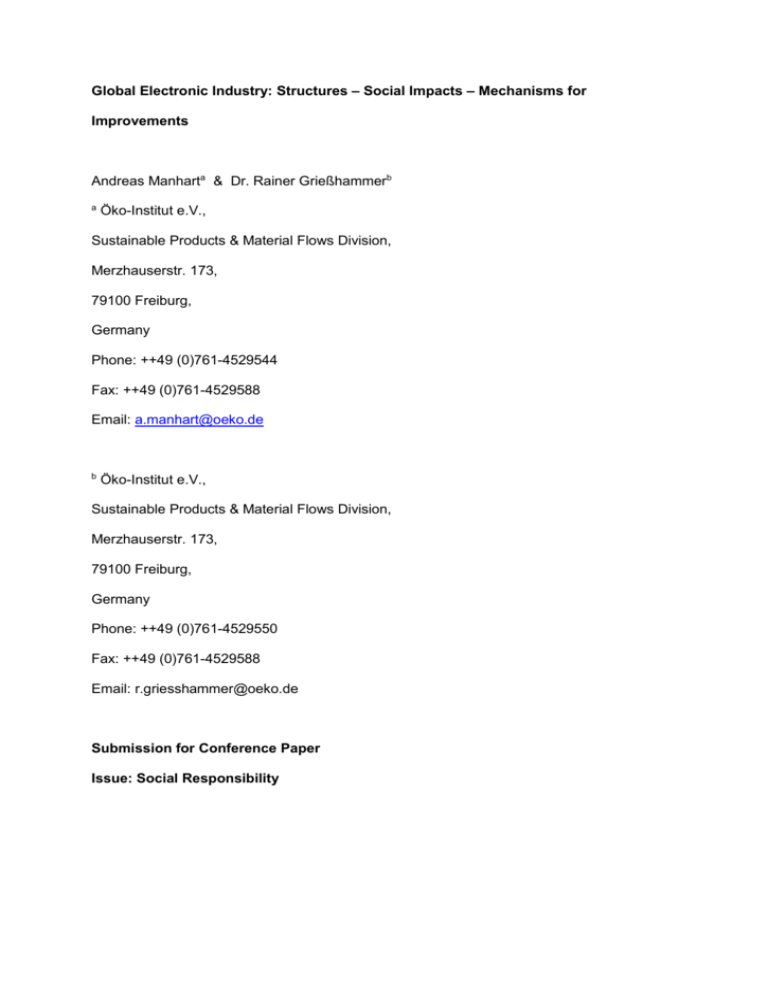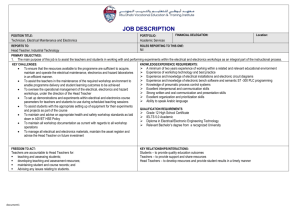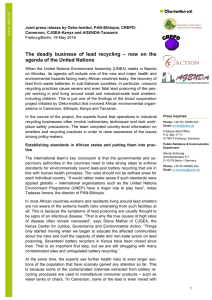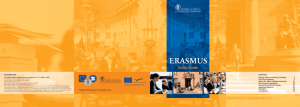Abstract Electronic Industry
advertisement

Global Electronic Industry: Structures – Social Impacts – Mechanisms for Improvements Andreas Manharta & Dr. Rainer Grießhammerb a Öko-Institut e.V., Sustainable Products & Material Flows Division, Merzhauserstr. 173, 79100 Freiburg, Germany Phone: ++49 (0)761-4529544 Fax: ++49 (0)761-4529588 Email: a.manhart@oeko.de b Öko-Institut e.V., Sustainable Products & Material Flows Division, Merzhauserstr. 173, 79100 Freiburg, Germany Phone: ++49 (0)761-4529550 Fax: ++49 (0)761-4529588 Email: r.griesshammer@oeko.de Submission for Conference Paper Issue: Social Responsibility Abstract Goals Within the last years numerous reports revealed considerable violations of international recognized labour-standards in the mass production of consumer electronics (CAFOD [1] Schipper & De Haan [2] Smith et al. [3]). According to the authors, the situation is worst in export processing zones of emerging economies where workers are often compensated below the legal minimum, are forced to work overtime and are frequently exposed to hazardous substances. In a number of European countries, these reports set off a considerable number of NGO-campaigns that are closely linked to the anti-globalisation movement. In this situation the Öko-Institut was commissioned by the German Federal Ministry of Education and Research to carry out a Social Life Cycle Assessment (SLCA) as described in the Institute’s PROSA-method (Product Sustainability Assessment). Thereby emphasis was placed on testing the life cycle approach for social aspects in the complex supply chains of the notebook industry. Furthermore it was aimed to identify feasible ways to improve the situation for employees in the global supply chain and to reduce the negative impacts for neighbouring communities. Scope In recent years, electronics production vastly migrated to mainland China, where now the majority of consumer devices is assembled. Furthermore the manufacturing of parts like microchips and printed circuit boards are also attracted by government subsidies, low labour costs and the need to keep close ties with major customers. Therefore the study mainly surveys the electronic industry located in the People’s Republic of China. It focuses on social issues in electronics assembly, the manufacturing of parts and components and explores the interactions with global market dynamics. Critical issues in the sourcing of raw materials are raised where necessary. The research resorts to the methodology of Product Sustainability Assessment by the ÖkoInstitut (Grießhammer et al. [4]) and is embedded in the development of a Social Life Cycle Assessment (SLCA) as currently undertaken by a special UNEP/SETAC Task Force on Integration of Social Aspects into LCA (UNEP-SETAC [5]). Thereby it is aimed to base the findings on methods that are also applicable for other product groups and industries. Conclusion The study (Manhart & Grießhammer [6]) confirmed most reports on working conditions in the notebook industry. In detail social “hot spots” were identified in the notebook-assembly, were about 75000 mostly female migrant workers are employed. During this production step key issues are excessive working hours, low compensation and the lack of union-like labour committees. Further hot spots are associated with the manufacturing of parts where employees are sometimes exposed to considerable health and safety risks. Nevertheless the notebook-manufacturing plays an important role in the economic development of China and helps to reduce extreme poverty - a fact often neglected by activists. On the other side, the current relocation of industries threatens development gains in some emerging economies like the Philippines and Mexico. With respect to the methodological development, the research illustrates the need for further standardisation as currently undertaken by the UNEP/SETAC Task Force Integration of Social Aspects into LCA. Therefore the study makes suggestions how the established LCA approach could be altered partly in order to fit to the needs of social analysis. Furthermore two main mechanisms were identified that have the potential to significantly improve social aspects in the value chains of electronics. The first are sound product policies in major market areas: The European RoHS-directive that eliminates led, cadmium, mercury, chromium-6 and the flame retardants PBB and PBDE in electronic appliances had an impressive spill-over effect on electronics production worldwide. If such regulations are successively expanded on further substances and implemented worldwide, some major health and safety risks could be avoided in the future. The second mechanism would be based on benchmark setting and certification: Consumers are more and more aware of the social impacts triggered by their purchasing decisions. Nevertheless, there is no guidance on responsible consumption for most product segments so far. Although this does exist for some food products (fair labels), manufactured goods are not yet covered by such schemes due to the complexity and non-transparency of its value chains. Taking the example of notebook production, the Öko-Institut proposes a way how to build up certification schemes that keep auditing efforts to a minimum without ignoring social realities on the ground. Keywords: electronic industry, social aspects, supply-chains, certification Selected references [1] CAFOD: Clean up your Computer. Working conditions in the electronics sector. London, 2003. [2] Schipper, I; De Haan, E.: CSR Issues in the ICT Hardware Manufacturing Sector. SOMO ICT Sector Report. Amsterdam, 2005. [3] Smith, T; Sonnefeld, D.A; Pellow, D.N.: Challenging the Chip. Labour Rights and Environmental Justice in the Global Electronics Industry. Philadelphia: Temple University Press, 2006. [4] Grießhammer, R; Buchert, M; Ebinger, F; Gensch, C.O; Graulich, K; Henseling, C; Hochfeld, C; Manhart, A.: PROSA – Product Sustainability Assessment. Freiburg, in press. [5] UNEP-SETAC: Feasibility Study: Integration of social aspects into LCA. Freiburg, 2006. [6] Manhart, A; Grießhammer, R.: Social impacts of the production of notebook PCs Contribution to the development of a Product Sustainability Assessment (PROSA). Freiburg, 2006.







